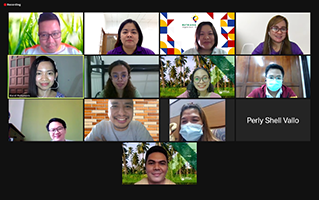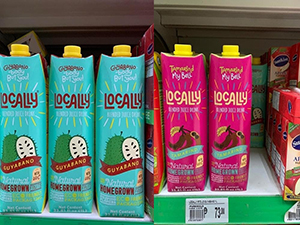 The Philippine Council for Agriculture, Aquatic and Natural Resources Research and Development of the Department of Science and Technology (DOST-PCAARRD) explores the possibility to link fruit farmers and food processing firms through the project, “Rapid Market Appraisal for Underutilized Fruits in the Philippines (RMA Fruits).”
The Philippine Council for Agriculture, Aquatic and Natural Resources Research and Development of the Department of Science and Technology (DOST-PCAARRD) explores the possibility to link fruit farmers and food processing firms through the project, “Rapid Market Appraisal for Underutilized Fruits in the Philippines (RMA Fruits).”
To jumpstart this initiative, the project team members met with NutriAsia and the Philippines Partnership for Sustainable Agriculture (PPSA) on March 22, 2021.
The RMA Fruits Project, which focuses on guava, soursop, sugar apple, and tamarind, aims to strengthen the potential of the identified underutilized fruits. The RMA Fruits Project is being implemented by the Socio-Economics Research Division (SERD) of DOST-PCAARRD.
A Farmer’s Database will serve as a link to the farmers to food processors and prospective buyers. This was discussed during the meeting with NutriAsia and PPSA. This solution hopes to address the issue of limited market outlets for the underutilized fruits.
The RMA project team members, composed of Princess Alma B. Ani, Annette M. Tobias, Ian Bernard M. Ines, Rocel Antonnete M. Peñamora, and Danica Louise C. Sembrano, presented the industry assessment highlights and key findings of the study on the industries of guava, soursop, sugar apple, and tamarind. The team also discussed production challenges met by the farmers, supply chain analyses, and the market potential of these underutilized fruits.
According to the team, the Farmer’s Database will include socio-demographic information of farmers, farm profile, type of underutilized fruits grown, size of area allocated for planting, number of bearing trees, estimated age, average yield, frequency of harvesting per year, output per harvest, and farmgate price of the four underutilized fruits. Ani and Tobias noted that the database will be accessible to both public or private entities by May 2021.
 Genevieve Santiago of NutriAsia acknowledged the importance of this initiative as this will be helpful in promoting local sources of raw materials. As majority of their supplies are imported, Santiago also highlighted that this initiative will help them establish a direct market linkage with local farmers. She suggested that other than the information on estimated yield/harvest, varieties, farmgate price, it would be ideal to include the seasonality of the fruits and the geographical areas where the fruits are available. This information will aid in sourcing off-season supply of fruits.
Genevieve Santiago of NutriAsia acknowledged the importance of this initiative as this will be helpful in promoting local sources of raw materials. As majority of their supplies are imported, Santiago also highlighted that this initiative will help them establish a direct market linkage with local farmers. She suggested that other than the information on estimated yield/harvest, varieties, farmgate price, it would be ideal to include the seasonality of the fruits and the geographical areas where the fruits are available. This information will aid in sourcing off-season supply of fruits.
Amy Chua of PPSA added that the project will enable them to further their efforts in addressing the gaps being faced by the farmers and support them by bringing more activities and opportunities.
On NutriAsia’s challenge of transacting with farmers due to their lack of regulatory/business permit requirements, the project team shared that despite the lack of business entities, many of the farmer-respondents were assisted by the Municipal Agricultural Offices of the selected areas.
The outcome of this database will be monitored by SERD-PCAARRD to recognize the collaborations established among the farmers and their key customers.
